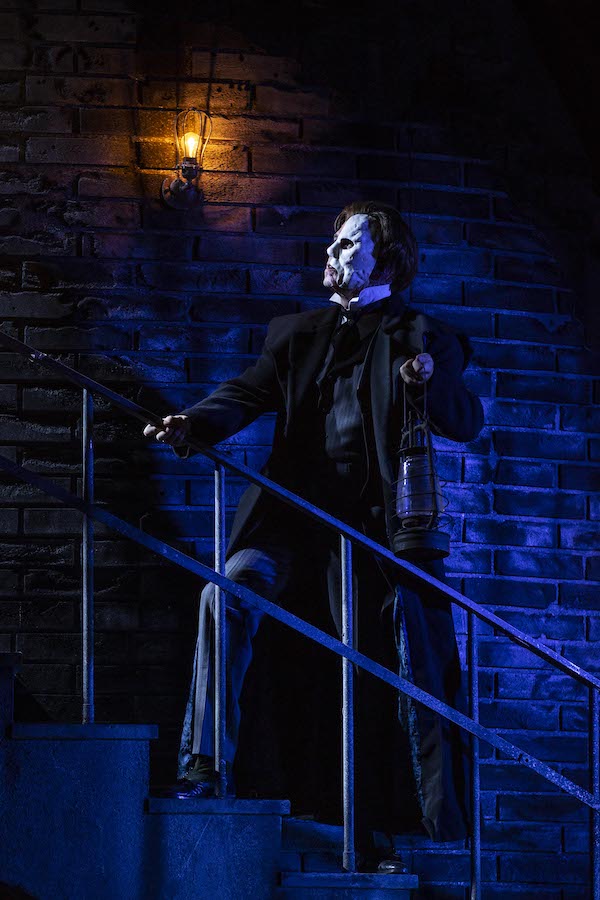DUBAI: The moment has finally come for Lebanese-British theater actor Nadim Naaman. For over a decade, he has been associated with the popular musical “The Phantom of The Opera,” initially joining as an ensemble member.
The play, which centers on the theme of unrequited love, was written by the famed English composer Andrew Lloyd Webber, and made its debut in London in 1986.
Growing up in the British capital, Naaman had seen the play’s posters on buses and taxis. It was a big deal in the world of theater.

Naaman worked his way up and recently landed the lead role of Phantom, making him the first actor of Arab origin to play the coveted male character on stage. (Supplied)
“I think I was probably 15 or 16 and my parents took my brother, sister and I to see it, like a family outing, and I remember thinking, ‘This is the best thing I’ve ever seen,’” Naaman told Arab News.
Naaman worked his way up and recently landed the lead role of Phantom, making him the first actor of Arab origin to play the coveted male character on stage.
Until March 10, “The Phantom of The Opera” will be playing at the UAE’s Dubai Opera, with a production team of over 100 cast and crew members from around the world.
For the actor, who has visited Dubai for three decades for family reasons, performing in the UAE feels like a full-circle moment. Last year, he also played the Phantom during the show’s run in Riyadh.
“I always knew that this was my dream role, and I just have to be patient and, hopefully, one day the opportunity would come,” he said ahead of the show’s opening night in Dubai.

For the actor, who has visited Dubai for three decades for family reasons, performing in the UAE feels like a full-circle moment. (Supplied)
“To be the first Arab to do so in this region, in Saudi and Dubai, is the perfect combination of circumstances ... I couldn’t have dreamt that would happen.”
The award-winning musical is based on the early 20th-century novel “Le Fantome de l’Opera” by the French author Gaston Leroux. Set at the Palais Garnier opera house in Paris, the venue is haunted by the hidden Phantom, a disfigured and passionate outcast, who falls for his protege, the young Swedish soprano Christine Daee. Things become intense when Christine’s lover, Raoul (played by Dougie Carter in the Dubai play), enters the picture.
“It’s such a strong story. It’s a love triangle, which is always a winner. There is an element of recluse — someone who doesn’t fit in society and, of course, everyone at some point in their life can relate to that,” the English actress Harriet Jones, who plays Christine, told Arab News.
“The story of Christine is really a coming-of-age story, which suits my journey with the show because I first played her 10 years ago. Nadim and I have known each other for 10 years now. We’ve kind of grown up together on this show.”
Naaman, who formerly played Raoul, says that the Phantom is unlike any other character he has taken on.

Naaman says that the Phantom is unlike any other character he has taken on. (Supplied)
“With Raoul, it did always feel quite close to me. The Phantom is the complete opposite. To get ready to play a character and to look in the mirror and see somebody who is nothing like you, who behaves in a way that is nothing like you, is a really exciting and quite liberating experience because every single move you make or word that comes out of your mouth has a motivation that you have to really discover. It’s not easy, it’s hard work, but that’s what makes it rewarding.”
The other bit of hard work has also been wearing a face prosthetic (of a burn scar) covered with the mask, along with a wig, for every performance. The fitting takes more than an hour but helps Naaman get into character.
Around 20 shows have been scheduled at Dubai Opera, and for Naaman and Jones, it is still a thrill singing in front of an audience every night.
“Standing backstage and listening to the overture, which is so loud and big and it goes through your chest, that is almost when it starts for me. It’s an incredible feeling,” said Jones.
Why has the musical been a hit with millions? Naaman believes it is the universality of its story that has made it popular until today, finding its way to new audiences in the Middle East.
“The show has been around for 40 years, but there is a new generation of audiences getting to experience it for the first time,” he said.
“Those key themes of love, unrequited love, and wanting to fit in and be accepted are relatable to all cultures, all ages, backgrounds. The key ingredients just keep people engaged the whole way through.”
























